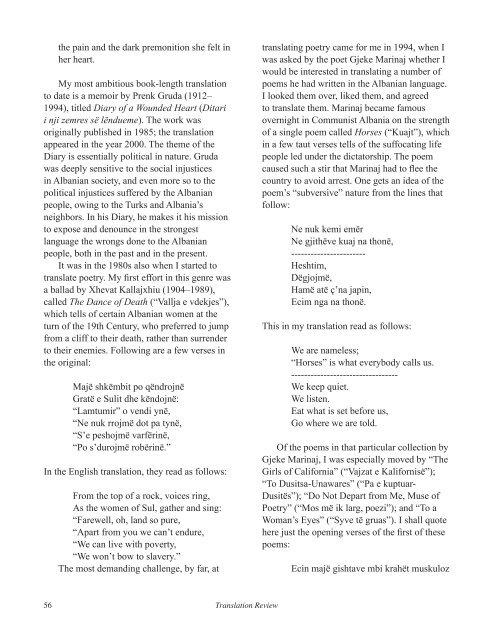Table of contents - The University of Texas at Dallas
Table of contents - The University of Texas at Dallas
Table of contents - The University of Texas at Dallas
You also want an ePaper? Increase the reach of your titles
YUMPU automatically turns print PDFs into web optimized ePapers that Google loves.
the pain and the dark premonition she felt in<br />
her heart.<br />
My most ambitious book-length transl<strong>at</strong>ion<br />
to d<strong>at</strong>e is a memoir by Prenk Gruda (1912–<br />
1994), titled Diary <strong>of</strong> a Wounded Heart (Ditari<br />
i nji zemres së lëndueme). <strong>The</strong> work was<br />
originally published in 1985; the transl<strong>at</strong>ion<br />
appeared in the year 2000. <strong>The</strong> theme <strong>of</strong> the<br />
Diary is essentially political in n<strong>at</strong>ure. Gruda<br />
was deeply sensitive to the social injustices<br />
in Albanian society, and even more so to the<br />
political injustices suffered by the Albanian<br />
people, owing to the Turks and Albania’s<br />
neighbors. In his Diary, he makes it his mission<br />
to expose and denounce in the strongest<br />
language the wrongs done to the Albanian<br />
people, both in the past and in the present.<br />
It was in the 1980s also when I started to<br />
transl<strong>at</strong>e poetry. My first effort in this genre was<br />
a ballad by Xhev<strong>at</strong> Kallajxhiu (1904–1989),<br />
called <strong>The</strong> Dance <strong>of</strong> De<strong>at</strong>h (“Vallja e vdekjes”),<br />
which tells <strong>of</strong> certain Albanian women <strong>at</strong> the<br />
turn <strong>of</strong> the 19th Century, who preferred to jump<br />
from a cliff to their de<strong>at</strong>h, r<strong>at</strong>her than surrender<br />
to their enemies. Following are a few verses in<br />
the original:<br />
Majë shkëmbit po qëndrojnë<br />
Gr<strong>at</strong>ë e Sulit dhe këndojnë:<br />
“Lamtumir” o vendi ynë,<br />
“Ne nuk rrojmë dot pa tynë,<br />
“S’e peshojmë varfërinë,<br />
“Po s’durojmë robërinë.”<br />
In the English transl<strong>at</strong>ion, they read as follows:<br />
From the top <strong>of</strong> a rock, voices ring,<br />
As the women <strong>of</strong> Sul, g<strong>at</strong>her and sing:<br />
“Farewell, oh, land so pure,<br />
“Apart from you we can’t endure,<br />
“We can live with poverty,<br />
“We won’t bow to slavery.”<br />
<strong>The</strong> most demanding challenge, by far, <strong>at</strong><br />
transl<strong>at</strong>ing poetry came for me in 1994, when I<br />
was asked by the poet Gjeke Marinaj whether I<br />
would be interested in transl<strong>at</strong>ing a number <strong>of</strong><br />
poems he had written in the Albanian language.<br />
I looked them over, liked them, and agreed<br />
to transl<strong>at</strong>e them. Marinaj became famous<br />
overnight in Communist Albania on the strength<br />
<strong>of</strong> a single poem called Horses (“Kuajt”), which<br />
in a few taut verses tells <strong>of</strong> the suffoc<strong>at</strong>ing life<br />
people led under the dict<strong>at</strong>orship. <strong>The</strong> poem<br />
caused such a stir th<strong>at</strong> Marinaj had to flee the<br />
country to avoid arrest. One gets an idea <strong>of</strong> the<br />
poem’s “subversive” n<strong>at</strong>ure from the lines th<strong>at</strong><br />
follow:<br />
Ne nuk kemi emër<br />
Ne gjithëve kuaj na thonë,<br />
-----------------------<br />
Heshtim,<br />
Dëgjojmë,<br />
Hamë <strong>at</strong>ë ç’na japin,<br />
Ecim nga na thonë.<br />
This in my transl<strong>at</strong>ion read as follows:<br />
We are nameless;<br />
“Horses” is wh<strong>at</strong> everybody calls us.<br />
---------------------------------<br />
We keep quiet.<br />
We listen.<br />
E<strong>at</strong> wh<strong>at</strong> is set before us,<br />
Go where we are told.<br />
Of the poems in th<strong>at</strong> particular collection by<br />
Gjeke Marinaj, I was especially moved by “<strong>The</strong><br />
Girls <strong>of</strong> California” (“Vajz<strong>at</strong> e Kalifornisë”);<br />
“To Dusitsa-Unawares” (“Pa e kuptuar-<br />
Dusitës”); “Do Not Depart from Me, Muse <strong>of</strong><br />
Poetry” (“Mos më ik larg, poezi”); and “To a<br />
Woman’s Eyes” (“Syve të gruas”). I shall quote<br />
here just the opening verses <strong>of</strong> the first <strong>of</strong> these<br />
poems:<br />
Ecin majë gishtave mbi krahët muskuloz<br />
56 Transl<strong>at</strong>ion Review

















